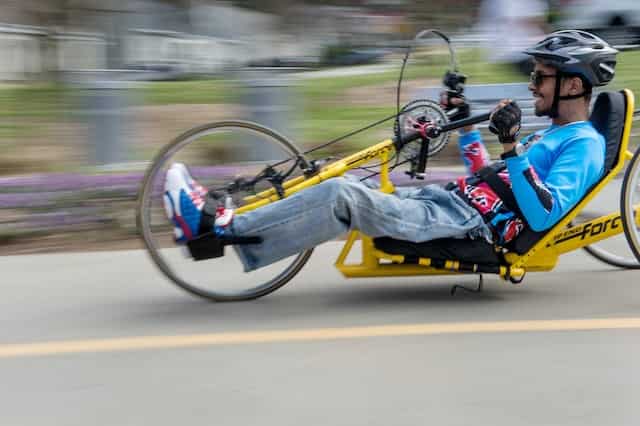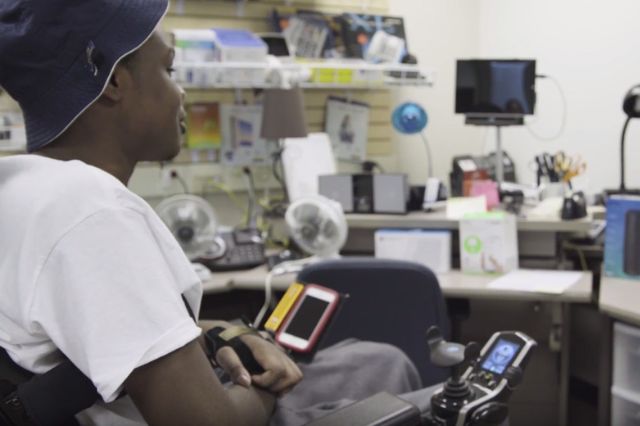What To Expect During Your Stay at Shepherd Center
One of the first things you will learn about Shepherd Center is our commitment to helping you become as independent as possible during your stay.
Our staff is here to guide you, but it is essential that you and your family take an active part in your care. What you do and learn during your stay will be with you the rest of your life.
Shepherd Center Staff Identification
You will recognize hospital staff by their identification badges. Employees, volunteers and vendors are required to wear nametags. If someone on staff is not wearing a nametag, ask for his or her name. You are entitled to know the identity of anyone who provides care for you.
Your Care Providers and Team Members
Here at Shepherd Center, a team of professionals works together with you and your family to coordinate your care, set your goals and keep track of your progress. This is called an interdisciplinary approach to patient care.
You and your family are an important part of the team. Each team member has a primary role, but you will find that many of these roles overlap. This is so that you and your caregiver have more opportunities to practice skills you learn and we make sure all the bases of your care are covered. Based on your needs, your team could include any of the following members:
Interdisciplinary Rehabilitation Team Roles
The interdisciplinary team is lead by your attending physician who directs your care, identifies problems and prescribes medication and other therapies. The physician will provide you with information about your injury or disease process, review your prognosis, and discuss your medical and rehabilitative care with you and your family. Your physician also will help you establish your rehabilitation goals, plan your discharge and approve any equipment you will need after discharge. You may also have other consulting doctors that will guide specific aspects of your care.
Case managers coordinate your services to make sure your hospital stay meets all your needs within the limits of available resources. Your case manager informs your insurance company of your progress, helps you plan where you will live after leaving Shepherd Center, talks to you about your personal and/or family concerns, schedules family training and therapy, helps you problem-solve and serves as your family’s main source of information.
Registered nurses (RN) will be assigned to take care of you during each shift. Our nurses are specially trained in the treatment of spinal cord injuries, neuromuscular disorders, multiple sclerosis and acquired brain injury. They will help guide your medical and rehabilitation program and help you learn to do your day-today activities again. He or she will help you manage your skin care, bowel and bladder program, and any pain you may be experiencing. You or your caregiver will learn about your medications, learn how to manage your bowel and bladder programs and take care of your skin.
An RN will also evaluate your health education needs and meet with you and your family to discuss your injury or disease. You will receive resources that you or your caregiver will be able to use after you leave Shepherd Center.
A patient care technician (PCT) is a nursing assistant who helps registered nurses care for you by helping with bathing, meal delivery, treatments and personal care.
Occupational therapists (OT) will look at how much strength and feeling you have, focusing mostly in your arms, hands and trunk. Then, he or she will work with you to regain daily living skills such as eating, grooming, dressing, driving and job performance. Depending on your diagnosis, an OT may also assist you to learn how to manage your bowel or bladder care. You will begin an exercise program to help you work on those skills.
You may also work on visual and cognitive skills with your OT. An OT may also assist you with equipment needs, computer access, return to driving plan and home safety recommendations according to your physical or cognitive needs. If you are experiencing pain, an OT may work with you to decrease it.
Certified Occupational Therapist Assistants (COTA) work under the direction of an OT and may also work with you to regain your ability to perform the skills listed above. He or she may help you work on memory skills or sequencing, activities of daily living, strength and movement, as well as walking or wheelchair mobility goals.
Speech/language pathologists (SLP) will help you work on memory, concentration, and language problems if you have them. He or she may help you with daily skills such as organization and planning activities. If you have an artificial airway, the speech therapists may also help you learn to talk on your own or with a special device. An SLP may perform tests to determine the cause of any hearing, chewing and swallowing problems and design treatment programs to help you address these problems. The SLP will work closely with the clinical dietician to make food choices if there are restrictions because of swallowing problems.
Physical Therapists (PT) will begin an exercise and therapy program with you after evaluating your muscle strength and sensation primarily in your trunk and legs and looking at your balance. You will work on regaining functional independence so that you can move from place to place, either in a wheelchair or by walking. As appropriate, you will also learn, for example, how to get in and out of bed, in and out of appropriate transportation, such as a van or car, and how to move around a bathroom or kitchen.
Your PT will work with you and your family or caregiver to see if your home needs to be modified for access and will help you make decisions regarding equipment you may need such as a wheelchair, bed or walking aid.
Physical therapist assistants (PTA) work under the direction of a PT, and also work with you to regain your ability to perform the skills listed above. He or she may help you work through your physical therapy rehabilitation program focusing on transfers, movement and strengthening, and helping meet any walking or wheelchair mobility goals.
PT and OT Aids work under the direction of physical therapists, physical therapist assistants, and occupational therapists and certified occupational therapist assistants. They may help to transfer you and assemble, clean and store equipment and supplies used in your care.
Clinical dietitians will assess your current nutritional status, provide recommendations for achieving optimal health, and monitor your progress throughout your rehab stay. Injury and surgery have significant impact on your nutritional status. In addition, the dietitian will provide education on topics such as maintaining a healthy body weight, role of fiber in your diet, prevention and treatment of skin wounds and diabetes.
Therapeutic recreation (TR) specialists will assess your leisure skill interests and help find ways to adapt these interests to fit your new lifestyle. He or she will also show you how to solve access problems in the community; work on self-advocacy in the community and talk through issues that may make you hesitant to return to previous activities. A TR specialist will take you out of the center to help you work on these skills in restaurants, shopping centers and at other events. Your TR specialist may consult with a professional in your area of interest such as gardening, sports, fitness, art and dance. The professional and TR therapist will further help you determine how to achieve your leisure goals.
Chaplains provide support and help you use your own spiritual beliefs and resources to deal with your injury or illness. A chaplain can help you find inner strength, hope, courage and determination through prayer, meditation, religious ritual and conversation. To request a visit by the chaplain, call the chaplaincy department at 404-350-7674.
Rehabilitation technology specialists and assistive technology specialists are experts in both technology and rehabilitation. They will talk to you about electronic equipment that may help you be more independent. This may include a wheelchair, telephone, computer, call system or remote controls.
Respiratory therapists will work with you to regain strength and regulate your breathing if your injury or disease affects your ability to clear secretions or breathe on your own. If you use a ventilator, we may try to help you become stronger so that you no longer need it to breathe. If you need a ventilator or still have an open airway at the time of your discharge, we will teach you and your family how to care for you and for your equipment at home.
Psychologists and counselors help you and those important to you deal with feelings related to the many life changes that are caused by your injury or illness. This is done through individual, group, and family counseling, sexuality and marriage counseling, and pain management. The psychologist or counselor will help you identify the resources you will need after discharge and assist you and your family to connect with support groups.
Neuropsychologists are specially-trained psychologists who work with individuals who have brain dysfunction. They use special types of tests to determine how well the brain is working in areas like memory, concentration, problem-solving, language and visual/constructional skills. They also help people cope with the changes in their lives that result from brain injury, such as controlling their behavior and emotions. Finally, they help teach the patient and his or her family about the effects of different kinds of brain dysfunction.
Research
Researchers are available to discuss the current research studies that are ongoing at Shepherd Center. Many different types of studies are available that are currently open for enrollment. Patients and families have opportunities to participate in a research class where they can learn about these studies.
Private and Semi-Private Patient Rooms on the Acquired Brain Injury Unit and Comprehensive Rehabilitation Unit
In Shepherd Center’s Acquired Brain Injury Unit and the Comprehensive Rehabilitation Unit, your loved one will most likely have a semi-private room sometime during their stay. We cannot guarantee that your loved one will be able to stay in a private room the full duration of their time on either of these units. Priority for private patient rooms is determined by these factors:
- Patients with infections
- Adolescents
- Patients with neurobehavioral challenges
- Patients in our Disorders of Consciousness Program
- Availability of male/female patient beds





